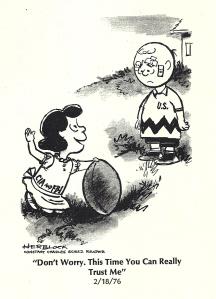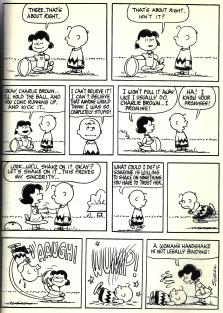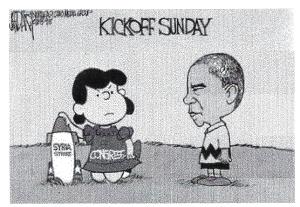While leafing through Herblock On All Fronts, a book of editorial cartoons by Herbert Block, I was struck by one cartoon in particular that was published on February 18, 1976, but resonates today. In it, Block uses Peanuts comic strip characters as an analogy of a political challenge during that time. He depicts Lucy as the “CIA and FBI” and Charlie Brown as “U. S.” Lucy is holding the football for a roughed up Charlie Brown to kick—again, and says, “Don’t worry. This time you can really trust me.” It was pertinent to politics then, and Jeff Darcy shows that it is pertinent to politics in September 2013 as well.

Don’t Worry. This Time You Can Really Trust Me, pen on paper cartoon from Herbert Block, printed on 18 February 1976; rpt. in Herblock on All Fronts (New York 1980) 49.
In 1976, Block was commenting on the illegal wiretaps by FBI agents and its collaborations with the Mafia on certain missions. Both the CIA and FBI planted false news stories in the media. Block also decried the efforts of the CIA to spy on American citizens such as Senator Robert Kennedy, Reverend Martin Luther King Jr. “as having the same high priority as its intelligence gathering on the Soviet Union and Communist China, according to CIA files” (Block 45). Referencing Richard Helms, former head of the CIA, Freedom of Information requests have impaired the agency’s ability to do its job, but it is clear that the CIA broke laws and compromised the U. S. Constitution in the name of national security.
In the last fifty years or so since the content to which this cartoon refers transpired, the CIA has managed to get America into even more trouble on the international front. There have been several coups and murders in Latin America that have been perpetrated wholly or in part by the CIA. More recently, the CIA led us to believe that Iraq had weapons of mass destruction at its disposal. After years of war and tens of thousands of deaths, America has had to concede that they did not exist. Now, in 2013, we find that the NSA (another intelligence department) has been illegally spying on Americans. When it was betrayed by one of its operatives, the agency tells us, “Don’t worry. This time you can really trust me.” Like Charlie Brown, Americans are expected to believe the intelligence services as they keep changing their stories, yes, like Lucy who pulls the ball away at the last second—and then rationalizes her actions.
Rhetorically, the use of Peanuts characters presents an ideal illustration of this type of political conundrum. While Charles Schulz was alive and drawing the strip, every October readers looked forward to reading about Lucy holding the ball for Charlie Brown, and what wiles she would use to entice him. The premise was always the same. Lucy would hold the football in place for Charlie Brown to kick. Charlie Brown would resist and make his case for Lucy’s lack of credibility. Lucy would finally convince him of her reliability, and Charlie Brown would run up to kick the ball. That is the process of politics in America. An official, usually the President, promises a beneficial practice for all Americans. Americans resist the change and make arguments about why the administration should not follow through. The administration convinces a majority of the public that the action is necessary, and proceeds vigorously. Ultimately, the government gets bogged down in some quagmire and succeeding administrations (and taxpayers) are charged with cleaning up the mess.

Peanuts Cartoon, pen on paper cartoon from Charles Schulz, rpt in Peanuts Treasury New York: 1968, unpaginated.
Americans are as aware of the story line of how the two characters behave as they are of George Washington and the cherry tree and other icons of American culture (I include a copy of it in case someone does not know of it or George Washington). Readers want Charlie Brown to turn around and walk away but know what the inevitable outcome will be. He will attempt to kick the ball and Lucy will pull it away at the last second. This is more than a simple bait-and-switch story; this is a story about dashed hopes, cynicism, and ultimately, the desire to trust others. Politically, it is the hope that elected officials are actually looking out for the good of their constituents and will not make promises that they have no intention of keeping. Schulz’s use of the two characters and their intercourse about the football is a universal analogy that is understood across time and cultures in a manner achieved by only the most enduring tales.
Jeff Darcy, Cartoonist for the Cleveland Plain Dealer, found the analogy compelling enough to use it on September 7, 2013. This time, Lucy is depicted as “Congress” and is holding a missile, labeled “Syria Strike,” for Charlie Brown, caricatured as President Obama, to kick.

Kickoff Sunday, pen on paper cartoon from Jeff Darcy Cleveland Plain Dealer, printed on 7 September 2013. http://www.cleveland.com/darcy/.
However, in this tableau, Lucy makes no attempt to lure Charlie Brown into attempting to kick, and unlike the Peanuts or Herblock versions, neither seems happy about the prospect of possibly completing the kick. While most cartoons suggest that there is a protagonist or villain, others, like this one, merely define the issue for the public by suggesting that Congress may or may not allow the President to order a strike on Syria. By the same token, Congress (Lucy) challenges the President to try his best at convincing Congress to “hold up” its end of the bargain and allow him to follow through on his threats. Ultimately, however, she will determine whether he kicks a field goal or whiffs at the missile attack and lands on his backside. At the time of the Darcy cartoon’s first printing and of this writing, no one knows how this story will end. Will Congress vote for an American attack on Syria? Will Obama attack Syria with or without confirmation from Congress? Will diplomacy intercept the whole process? It is clear that this political metaphor from the Peanuts comic strip is as apt in 2013 as it was in 1976.
Source Consulted:
Block, Herbert. Herblock on all Fronts. New York: Signet, 1980.
